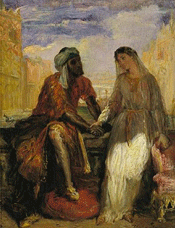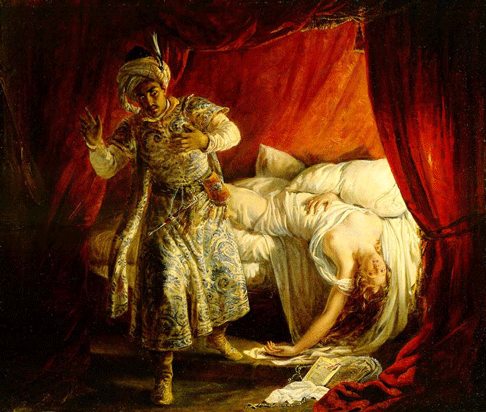
23 Jun 2010
VERDI: Otello — La Scala 1954
Otello: Dramma lirico in four acts.
Music composed by Giuseppe Verdi. Libretto by Arrigo Boito after The Tragedie of Othello, the Moore of Venice by William Shakespeare.
Mozart and Salieri, an opera in one act consisting of two scenes.
Nicolai Rimsky-Korsakov (1844-1908), composer. Libretto derived from Alexander Puskhin's play of the same name.
First performance: 7 December 1898 in Moscow.
Ariadne auf Naxos, Oper with a prologue and one act. Music composed by Richard Strauss. Libretto by Hugo von Hofmannsthal.
La Vestale, a tragédie lyrique in three acts.
Boris Godunov, an opera in four acts with prologue
Modest Mussorgsky, composer. Libretto by the composer, based on Alexander Pushkin's drama Boris Godunov and Nikolai Karamazin's History of the Russian Empire
First performance: 8 February 1874 at the Mariinsky Theatre, St. Petersburg
Il Trovatore, dramma in four parts.
Only a few months following the premiere of Der Rosenkavalier, Hugo von Hofmannsthal proposed a new opera to Richard Strauss based on Molière’s comedy-ballet, Le Bourgeois gentilhomme (in German, Der Bürger als Edelmann).
Die Entführung aus dem Serail, Singspiel in 3 Acts.
Music composed by Wolfgang Amadeus Mozart (1756–1791). Libretto by Johann Gottlieb Stephanie the Younger, based on an earlier libretto by
Christoph Friedrich Bretzner.
Die Entführung aus dem Serail, Singspiel in 3 Acts.
Music composed by Wolfgang Amadeus Mozart (1756–1791). Libretto by Johann Gottlieb Stephanie the Younger, based on an earlier libretto by
Christoph Friedrich Bretzner.
Arabella: Lyrische Komödie in three acts
Die Entführung aus dem Serail, Singspiel in 3 Acts.
Music composed by Wolfgang Amadeus Mozart (1756–1791). Libretto by Johann Gottlieb Stephanie the Younger, based on an earlier libretto by
Christoph Friedrich Bretzner.
La Gioconda, dramma lirico in four acts.
Music composed by Amilcare Ponchielli (1834–1886). Libretto by Arrigo Boito (under the pseudonym Tobia Gorrio), based upon Victor Hugo's Angelo, Tyrant of Padua (1835).
Don Carlo, an opera in four acts. Music composed by Giuseppe Verdi (1813–1901). Libretto by Joseph Méry and Camille Du Locle after Friedrich von Schiller’s dramatic poem Don Carlos, Infant von Spanien. Revised version in four acts (French text revised by Du Locle, Italian translation by Achille de Lauzières and Angelo Zanardini).
Un ballo in maschera, a melodramma in three acts.
Music composed by Giuseppe Verdi. Libretto by Antonio Somma, based upon the work of Eugène Scribe Gustave III ou Le bal masqué (1833)
Medea: Melodramma tragico in three acts.
Die Tote Stadt, an opera in three acts.
Music composed by Erich Wolfgang Korngold (1897-1957). Libretto by Paul Schott (Julius and E. W. Korngold) after the novel Bruges la morte by Georges Rodenbach.
Some Details concerning the Revolution inaugurated by Rossini
Manon Lescaut, dramma lirico in quattro atti
Elektra: Tragedy in one act.
Lyric Opera of Chicago has announced both schedules and cast-lists for is Spring 2020 performances of Richard Wagner’s Ring Cycle. Given the series of individual productions already staged by the company since Fall 2016, that pave the way for the complete cycle, Lyric Opera of Chicago’s complete production should affirm the artistic might of the great composer.
“Diacono himself does not know what musical talent he possesses” – Mascagni

Otello: Dramma lirico in four acts.
Music composed by Giuseppe Verdi. Libretto by Arrigo Boito after The Tragedie of Othello, the Moore of Venice by William Shakespeare.
Streaming Audio
First Performance: 5 February 1887, Teatro alla Scala, Milan.
| Principal Roles: | |
| Otello, a Moor, general of the Venetian army | Tenor |
| Iago, an ensign | Baritone |
| Cassio, a platoon leader | Tenor |
| Roderigo, a Venetian gentleman | Tenor |
| Lodovico, an ambassador of the Venetian Republic | Bass |
| Montano, Otello’s predecessor as Governor of Cyprus | Bass |
| A Herald | Bass |
| Desdemona, Otello’s wife | Soprano |
| Emilia, Iago’s wife | Mezzo-Soprano |
Setting: A maritime city on the island of Cyprus, at the end of the 15th century
Synopsis:
Act I
Cyprus, near the harbor; an inn nearby, the castle in the background
It is night and a storm is raging. The people of the island are looking out to sea, anxious for Otello’s ship. It arrives safely and he greets the crowd with a shout of triumph: the storm which has spared him has completed the destruction of the Turkish fleet begun by him. Frustrated in his love of Desdemona, Roderigo is ready to drown himself, but Iago counsels him to be sensible. He hates Otello for having appointed Cassio captain over his head and will help Roderigo and have his own revenge at the same time.
As the islanders celebrate, Iago invites Cassio to drink the health of Otello and Desdemona, knowing that he has no head for liquor. Prompted by Iago, Roderigo begins a quarrel with the intoxicated Cassio, and when Montano tries to stop them, Cassio attacks him. Iago urges Roderigo to rouse the town.
Otello interrupts the fight and, discovering that Montano is wounded and angry because Desdemona’s sleep has been disturbed, demotes Cassio. He orders Iago to calm the population. Otello and Desdemona, left alone, remember the days of their courtship.
Act II
A hall in the castle with a garden in the background
Iago suggests to Cassio that he try to regain favor by asking Desdemona to intercede for him and exults in his inborn capacity for evil. He watches as Cassio approaches Desdemona and, noting the arrival of Otello, pretends to be worried about Cassio’s manner, going on to suggest the possibility of a relationship between him and Desdemona. He then warns Otello to beware of jealousy and advises him to observe his wife. After groups of Cypriots have sung a welcome to Desdemona she begins to plead for Cassio, but Otello puts her off, complaining of a headache. When she tries to bind his forehead with a handkerchief, he throws it to the ground, where it is picked up by Emilia.
Desdemona begs her husband to forgive her if she has unconsciously offended him and he broods that she may have ceased to love him because of his color and age. Iago snatches the handkerchief from Emilia, intending to leave it in Cassio’s lodging.
Otello orders Desdemona to leave and Iago continues to undermine Otello’s faith in her. Lamenting that his peace of mind has gone, Otello demands proof of her infidelity, so Iago claims to have overheard Cassio in his sleep betraying his love for her. He also says that he has seen the handkerchief, Otello’s first love-token to Desdemona, in Cassio’s hand. Otello vows vengeance and Iago vows to dedicate himself to this cause.
 Othello and Desdemona, by Alexandre-Marie Colin [Source: Wikipedia]
Othello and Desdemona, by Alexandre-Marie Colin [Source: Wikipedia]
Act III
The great hall of the castle
A herald announces the arrival of a galley from Venice. Iago promises to induce Cassio to betray his love for Desdemona in Otello’s hearing.
When Desdemona again tries to speak of Cassio, Otello asks her to bind his forehead with the handkerchief. Becoming agitated when she is unable to produce it, he warns her that its loss will bring misfortune and accuses her of infidelity, driving her away, unmoved by her tears and protestations of innocence.
His grief at this affliction which has been sent to try him turns to rage as Iago gets him to hide while he talks to Cassio — a cunningly contrived conversation partly about Desdemona and partly about the courtesan Bianca, who is madly in love with Cassio. Otello, unable to hear everything, misinterprets Cassio’s amusement, particularly when Cassio produces the handkerchief, expressing puzzlement as to how it appeared in his lodging, and he and Iago laugh.
As trumpets proclaim the arrival of the Venetian ship, Otello resolves to kill Desdemona and Iago promises to take care of Cassio. Everyone gathers to welcome the ambassador. As Otello reads the despatches brought by Lodovico, he hears Desdemona express sympathy for Cassio and strikes her. He announces that he has been recalled to Venice and Cassio appointed in his place. Lodovico tries to make peace between him and Desdemona, but he throws her to the ground. Furious at Cassio’s promotion, Iago incites Roderigo to murder him, as a means of keeping Otello and Desdemona in Cyprus.
Otello orders everyone to leave, cursing Desdemona when she tries to approach him. As he falls to the ground in a fit, Iago gloatingly places his foot on him.
Act IV
Desdemona’s bedroom
As Desdemona prepares for bed, assisted by Emilia, her heart is full of foreboding and she remembers a girl called Barbara, who died of unrequited love, singing “a song of willow.” Bidding Emilia good night, she prays, then goes to bed.
Otello enters, wakes her with a kiss and tells her to pray for forgiveness for any unabsolved sins. She begs for her life, denying his accusations of infidelity with Cassio. He strangles her. Emila brings the news that Cassio has killed Roderigo, but is unharmed. Hearing Desdemona’s dying protestations of innocence, Emilia calls for help. She reveals the truth about the handkerchief and Montano says that Roderigo had revealed what he knew of the plot before dying. Iago flees, refusing to exculpate himself.
Lodovico takes Otello’s sword, but Otello draws a knife and kills himself, kissing Desdemona as he dies.
[Synopsis Source: Opera~Opera]
Click here for the complete libretto.
Click here for the complete text of The Tragedie of Othello, Moore of Venice and related materials.